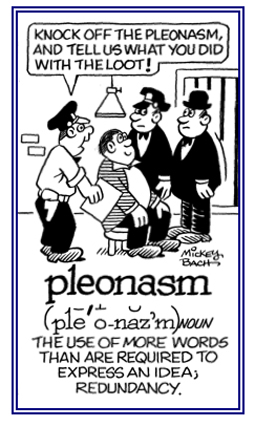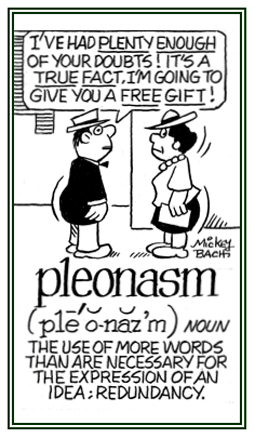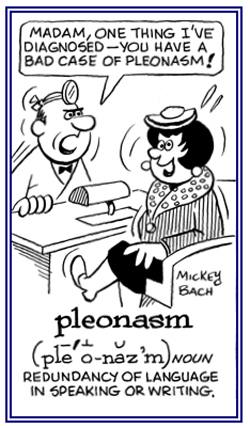A “gift" is always "free"; so the use of the term “free” is a pleonasm which is not needed to express the word “gift”!
2. The use of more words than are required to communicate, or superfluous expressions of words, when talking or writing: Whenever Jane answered a question for the professor in the mathematic's class, she used pleonasms instead of short to the point answers which made the other students think she was really trying to make everyone believe that she was a specialist in the subject.


Go to this Word A Day Revisited Index
so you can see more of Mickey Bach's cartoons.
- It's deja vu all over again. -Attributed to Yogi Berra
The term, deja vu, means "a feeling of having experienced something before although in fact it is the first time that it has been experienced".
- "Smoking can kill you, and if you've been killed, you've lost a very important part of your life." -Attributed to actress, Brooke Shields
- Lead-lined coffins called a health risk.
- Census says rich have most of the money. (news item)
- Cliches are a dime a dozen. . . avoid them like the plague.
- Cure suggestibility with hypnosis.
- I've told you a million times, "Don't exaggerate!"
- Is that a mirage or am I seeing things?
- It's bad luck to be superstitious.
- I used to be an agnostic, but now I'm not so sure.
- Sometimes you can observe a lot just by watching. -Attributed to Yogi Berra
- Half the lies our opponents tell about us are not true.
- Football is an incredible game. Sometimes it's so incredible, it's unbelievable. -Tom Landry
- When large numbers of men are unable to find work, unemployment results. -Calvin Coolidge
- Anyone who goes to a psychiatrist ought to have his head examined. -Samuel Goldwyn
- I never make predictions, especially about the future. -Attributed to Samuel Goldwyn
- "In the city today, the temperature rose to 105 degrees. This sudden rise of temperature was responsible for the intolerable heat."
- "Trapped, like a trap in a trap." -Dorothy Parker
- I used to be indecisive, now I'm not sure.
- He lived his life to the end.
- Some people are superficial but that's just on the surface.
- The world is apathetic but I don't care.
- Always avoid alliteration.
- Treachery will often bring loyalty into question.
- Perspective is in the eye of the beholder.
- "If we do not succeed, we run the risk of failure." -Attributed to former Vice-President Dan Quayle
- Seen somewhere in the U.S.: "Fish and chips with French fries."
This practice may have been a result of expressing English documents with a mixture of Anglo-Saxon and French, or Latin terms.
When early writers weren't sure if both designations had the same meaning, or that others might not have a clear understanding of the French or Latin, they apparently included terms from both the Anglo-Saxon and the "foreign"; words side by side, just to be sure others understood what was meant. This is according to David Crystal in The Cambridge Encyclopedia of Language.
Pleonasms are the opposites (antonyms) of oxymora. A pleonasm consists of two concepts (usually two words) that are redundant. What does "redundant" mean? Well, how about "more than enough; overabundant; excessive; and superfluous"?
Still having a problem understanding what pleonasm means? Some pleonastic expressions are also known as tautologies. Tautology means, "needless repetition of an idea in a different word, phrase, or sentence; redundancy; pleonasm". All right, what about pleonasm? Well, it means, "the use of more words than are necessary for the expression of an idea; redundancy".
So it is that we go around in circles: pleonasm means tautology, which means redundancy, which means pleonasm, which means tautology, ad infinitum.
